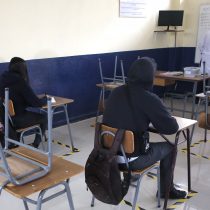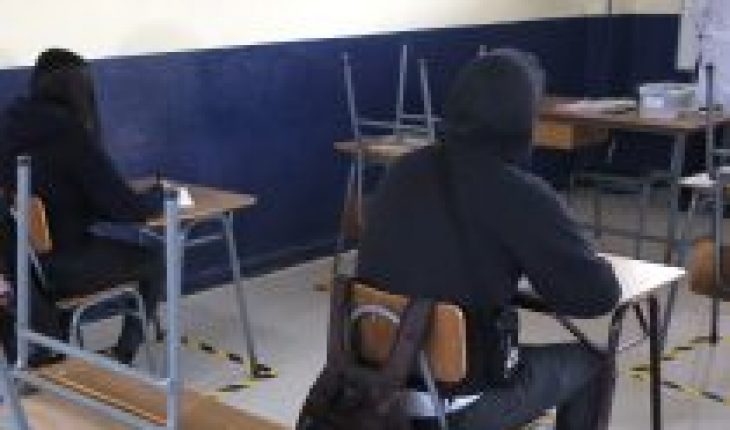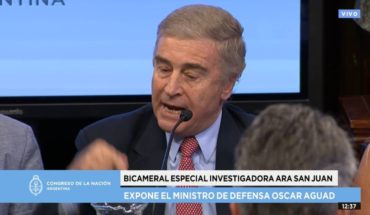
This Saturday at the Palacio de La Moneda, the Minister of Education, Raúl Figueroa, together with his counterpart from Segegob, Jaime Bellolio, and the Undersecretary of Public Health, Paula Daza, announced the results of the “Citizen Listening Days of Education and Pandemic”, held with different actors of civil society, representatives, directors of educational establishments , supporters, mayors and teachers.
In total, 151 people and more than 120 organizations from 14 regions of the country were able to express to the authorities the various visions, suggestions and concerns regarding the return to classes in person, perspectives that were systematized and will serve as analysis resources for the modifications to the health strategy led by the Ministry of Health.
The results of these working groups concluded that there are six issues of cross-cutting concern for communities: 1) the consequences on the development of learning and the increase in educational gaps, 2) the loss of educational experience and, above all, the practical component, 3) the problems of existing connectivity by socioeconomic situation and area of residence , 4) the difficulty of households to respond to the needs of children and young people, beyond the cognitive, 5) the rebuilding of trust with educational communities to mitigate feelings of fear and lack of protection, and 6) it is essential to consider education as a priority issue.
“The process of active listening and dialogue that we carry out, with more than 120 organizations linked to the education sector, is a contribution to the conversation that our country must have around how relevant education is, always, and particularly in this context of pandemic. Fundamentally, to move towards a new presence, which dialogues with the needs of each of the members of the educational community, through transversal agreements that mean maximum coordination between the different levels of the education system and the government, putting as a priority the well-being of our children and young people, “said the Minister of Education , Raúl Figueroa.
Minister Jaime Bellolio, for his part, stressed the importance of the citizen listening process carried out during these days. “To emphasize a fundamental aspect: education is essential, it is too relevant not only for the learning, for the cognitive, but also for its socio-emotional aspect, and that something that appears in a transversal way in each of the conversations we have had. Those who are teachers, transporters, entrepreneurs, etc., we are also fathers, mothers, sons, daughters and grandchildren, in this there has to be a transversal aspect. Unfortunately there are some who want to subtract even from the dialogue, but most of the citizens are open in it, in that we have agreements on those things that are fundamental for our country, such as education. We know that classroom work is absolutely irreplaceable, something that has been recognized by the UN, UNICEF, various international organizations and national experts in education.”
Undersecretary Daza stressed that the work done in these roundtables will be an important input for the analysis of the changes that will be made in the Step-by-Step Plan. “We will analyze all these suggestions to be able to generate a Step by Step Plan where children are first, because their learning and the containment that the school community gives them is essential for their development. We will take the measures to reconcile in the best possible way their access to this education, without neglecting health at any time”.
One of the aspects highlighted in the document is that most of the participants consider it necessary for the establishments to be available to receive students, through a new form of presence, being fundamental to rebuild trust with the educational communities to deliver them: security (the material conditions necessary to minimize health risks), stability (certainty regarding the continuity of decisions in relation to education) and em pathy (understanding of the situations and needs of each educational community, its students and workers).
Effective communication: Increasing the motivation of households to attend educational establishments by the Government, con focus on people and educational establishments.
New face-to-face: Move towards a new presence that dialogues with remote classes, ensuring the continuous opening of educational establishments. There is broad consensus that educational establishments should remain open independent of the phases of the Step-by-Step Plan.
It is proposed that the establishments be available to households who want and need to return to face-to-face classes. Consider education as essential to ensure the social-emotional well-being of children and adolescents.
The challenge is how to ensure face-to-face classes without going to the detriment of remote classes, since both modalities of attendance will continue to exist and coexist.
Make the synchrony of the hybrid face-to-face- remote system more flexible. Seek success stories and best practices to ensure an effective mixed regime, which ensures the well-being of both teams and households.
Empower the educational communities to advocate for a return to face-to-face classes, and that the motivation comes from community work, integrating the representatives in the discussion of the changes that are made to the return plan.
Sanitary and transport measures: Ensure an adequate physical environment in favor of face-to-face. Make modifications that allow safe transportation between homes and educational establishments. Among the suggested modifications are mentioned modification of class schedules, shift system, subsidies, prioritization of education over other activities for the use of public transport.
Ensure resources in an adverse context. It is proposed, for example, to make the use of resources more flexible, such as the subsidy system (SEP), junaeb’s food service, with a focus on rural establishments.
Increase psychological and pedagogical support to educational communities.
Reach cross-cutting agreements and coordination between the different levels of the education system. For example, a broad political agreement that prioritizes children and adolescents, and that seeks strategies to address the diversity of needs.
The College of Teachers of the Metropolitan Region released the results of the survey “Back to School in times of pandemic”.
The survey asks “do you consider that today the conditions exist to reopen schools for face-to-face classes in the commune where you live, work or study your children?” 75.7% of respondents answered no, 20.2% think so and 4.1% do not know.
According to the regional president of the guild, Mario Aguilar, in the survey — hosted on its website — 22,018 people participated, including citizens interested in the subject (2.5%), teachers (29%), education assistants (4.1%), students (5.5%) and representatives of municipal schools (35.1%), subsidized individuals (13.2%) and paid individuals (10.6%).
The second question of the survey was “what are the conditions that must be ensured to restart the opening of schools?”. The first majority (62.2%) noted “when the health indicators (PCR test positivity, daily number of infections, occupation) are down”, in the second majority (56.3%) “when all safeguard measures for students and education workers are guaranteed” and in the third majority (39.1%) he replied that “there are no conditions to return to face-to-face classes throughout 2021.”
“Considering the phases set out in the government’s Step-by-Step plan, at what stage do you think schools can be reopened?” that was the third question. 33.9% of respondents answered that it would be in phase 5; 22.8% in phase 4; 12.3% in phase 3; 9.1% in phase 2 and 10.1% in phase 1, leaving 11.9% who answered that “do not know”.
Finally, 43.4% of the respondents rated as insufficient the support given by the government, through the Mineduc, to facilitate online work during the pandemic, 30.6% as null, 20.8% as sufficient and 5.2% as excellent.
Mario Aguilar pointed out “the results are quite convincing. 75% believe that today the conditions for reopening schools are not in place (…) and the answer on the conditions that should exist to reopen schools differs greatly from what the government and the Minister of Education (Raúl Figueroa), in particular, are proposing.”
Later on Twitter, Professor Aguilar lashed out at the announcement by the Minister of Education and Undersecretary Daza. “They give the report on a supposed day of ‘participation’ to open schools in pandemic. This was a pantomime of participation, as a guild we were not invited and neither were real organizations. That was a meeting of friends,” he said.





